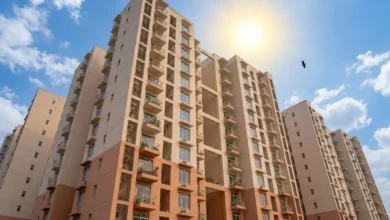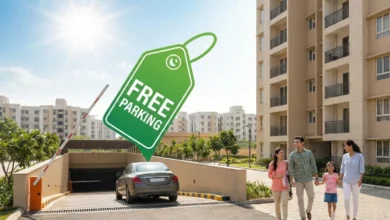High Court Probes Noida Authority’s OCs Issued to Lotus Boulevard Despite Sewage Issues

The Allahabad High Court has raised serious questions regarding the Noida Authority’s decision to grant occupancy certificates (OCs) to residential towers in the Lotus Boulevard complex, even though its sewage treatment infrastructure was allegedly incomplete or non-functional at the time. The court has directed the Authority to file a detailed affidavit by July 16, clarifying compliance with environmental and building regulations when the OCs were issued back in 2012 and 2016.
The heart of the matter lies in a petition filed by the Apartment Owners Association (AOA) of Lotus Boulevard, a sprawling gated community in Sector 100. They contend that, when OCs were granted for various buildings—first in August 2012 for towers 1–7, and then in March 2016 for towers 8–10, 12, 12A, and 14–27—only “one-and-a-half STPs were partly built,” despite bylaws mandating four fully functional sewage treatment plants. This alleged shortfall is not mere bureaucratic negligence: residents say it led to persistent sewage overflows and environmental hazards throughout the decade.
What the Court Demands
On July 7, the court issued an expansive order requiring the Noida Authority’s CEO to submit an affidavit by the next hearing on July 16. The affidavit must detail:
- Exactly how many STPs were required vs. how many were installed at each OC stage.
- Construction timelines and handover dates for each STP.
- A status update on whether those STPs are functional now, along with their capacities.
- Names of Authority officials responsible for inspecting the STPs before issuing OCs.
- Any corrective action taken—financial penalties, repairs, or improvements—since the initial certificates were granted.
These directives set a high bar for transparency, forcing the Authority to justify both past and present practices.
Noida Authority’s Position
The Authority rejects the AOA’s allegations, asserting that all approvals were granted in line with building bye-laws and environmental regulations. Since April 2025, it has also been tightening enforcement around sewage treatment compliance through fines, FIRs, and even deregistration in egregious cases .
What’s unfolding in Lotus Boulevard is merely part of a broader Office of Environmental Oversight drive. A recent Right to Information (RTI) disclosure revealed that as many as 43 group housing societies in Noida, including Lotus Boulevard, operate their STPs without the mandatory “Consent to Operate” (CTO) from the Uttar Pradesh Pollution Control Board.
- 34 societies are facing prosecution.
- 30 have already been hit with penalties totalling around ₹27 crore—though it’s unclear how much has been collected The Times of India.
- A sizeable chunk of these societies never installed STPs in the first place, or lack space/capital to do so after possession was handed over.
The Noida Authority now insists that no new OCs will be issued without a valid CTO, and has assembled an environmental cell to audit all large housing societies.
Apartment Owners’ Associations (AOAs)
Apartment Owners’ Associations (AOAs) and broader federations like NOFAA and NHRF argue that these post-facto demands are unfair. In sectors developed before such regulations were standard, many societies face severe space constraints, making retrofitting STPs nearly impossible. Nearly two-thirds of these societies fall within sectors 74–78—built before sewage permitting became a priority.
AOAs have called the drive “autocratic” and are pushing for alternative solutions such as cluster-based sewage treatment systems serving multiple societies—an approach approved several years ago but never implemented.
Relevant Legal Precedents
This isn’t the first time Noida Authority’s OC practices have drawn legal ire:
- In 2015, the National Green Tribunal (NGT) rebuked the Authority for issuing “partial” OCs without functional STPs. It directed the Enforcement Directorate and environmental agencies to take action under the Water and Air Acts.
- The RG Residency case in Sector 120 led to directions from a joint committee involving the state pollution board. The committee confirmed that the STP was non-functional and untreated sewage was being funneled into municipal networks. Substantial environmental compensation—around ₹91.4 lakh—was recommended, and prosecution ensued. RG Residency even secured a temporary stay from the Allahabad High Court.
These past actions pave the way for heightened scrutiny in the Lotus Boulevard case and may signal stricter enforcement going forward.
The implications extend beyond Noida’s housing societies. Untreated sewage poses a serious public health and ecological threat. Polluted groundwater, overflowing drains, and unpleasant odors are common hazards in inadequately served urban clusters.
The case also touches on fundamental urban governance principles—are environment-related approvals a mere rubber stamp at the time of OC issuance, or meaningful safeguards for community ecosystems?
What Happens Next?
- Affidavit Deadline: July 16 — The Authority must file a detailed affidavit addressing the High Court’s queries.
- Future Hearings: Depending on the affidavit, the HC may follow through with orders for remediation, punitive cleanup actions, or hold officials accountable.
- CTO Enforcement: No new OCs will be issued without CTOs. The environmental cell may unveil broader compliance gaps.
- Resident Pushback: AOAs are bracing for contentious hearings and may push for collaborative sewage solutions.
For thousands of homeowners in Noida, the stakes are personal—whether their apartments are legally habitable or mired in environmental risk. For the Noida Authority, the Lotus Boulevard case serves as a litmus test: can it defend its record under judicial scrutiny—and will it uphold environmental safeguards moving forward?
If the affidavit fails to demonstrate compliance—or if remedial action remains cosmetic—the High Court could compel retrofitting of STPs, penalize officials, or impose new operational caps. A stronger, enforceable regime (like cluster-based treatment) may finally gain traction.





